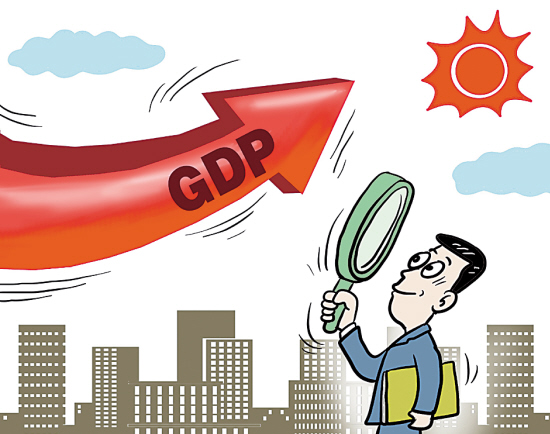China: Goodbye, GDP
- By He Shan
 0 Comment(s)
0 Comment(s) Print
Print E-mail China.org.cn, November 10, 2013
E-mail China.org.cn, November 10, 2013
|
|
|
China's new leadership is poised to tolerate slower growth as it tries to shake off its long-term GDP mania and put social progress and environmental welfare at the top of the nation's agenda. [File Photo] |
China's new leadership is poised to tolerate slower growth as it tries to shake off its long-term GDP mania and put social progress and environmental welfare at the top of the nation's agenda.
Under the existing "GDP growth is the king" performance evaluation plan, local government leaders have strong incentives to push investment, without any regard for the quality of peoples' lives or environmental capacity.
An encouraging message from China's leadership was President Xi Jinping's call for putting an end to the performance evaluation system based on GDP growth during a recent field trip to Hunan Province.
His remarks came just before China's leaders attend the Third Plenary Session of the 18th CPC Central Committee from November 9 to 12, a meeting that will address the deepening of China's reforms for the next decade.
On separate occasions, Xi has stressed the urge to shed the nation's seeming obsession with GDP growth. "We should no longer judge leaders solely by GDP growth. Instead, we should look at welfare improvements, social development and environmental indicators to evaluate leaders," Xi told Party leaders in a speech last June.
"President Xi's emphasis on correcting the 'GDP-oriented' performance evaluation system is an important signal, indicating the central government will be committed to rebalancing and local governments may revise their previous GDP targets," said Tang Jianwei, an analyst with China's Bank of Communications.
China's economy has grown at an astounding rate of around 10 percent over the past three decades, making it to the top ranks of the world's economies, generating wealth and boosting global trade. At the same time, the nation enjoyed relatively low unemployment rates and maintained both social and political stability.
As it has now entered an era of slower growth after three decades of double-digit annual economic boom, the world's second largest economy has come to a crossroads.
With GDP growth coming in at 7.5 percent during the second quarter of this year, the lowest level in four years, previous Chinese leaders would have opted to introduce new infrastructure spending programs or stimulus policies to bolster the economy, yet the new government is trying to seek a longer-term remedy without announcing new expenditure initiatives. The move sends out a strong signal that China is now willing to live with slower growth.
"China's 7 to 8 percent annual growth is suitable and will become a norm in the future," said Li Yining, a prominent Chinese economist. "Restructuring the economy is more important for China than merely pursuing GDP growth."
Chinese top leaders have realized the growth came at a very high cost as real estate prices skyrocketed, the wealth gap widened and environmental pollution worsened. They are determined to move towards cleaner economic growth, less dependent on heavy investment and more on consumption. This is not an easy breeze; it entails a crucial shift towards the long dormant Chinese consumption by opening up one of the world's fastest-growing consumer markets to the outside world.
In its latest move to boost demand and propel industry growth, China is set to issue 4G network licenses before the end of this year and increase 3G network coverage.
More proof of China's commitment to improving people's welfare lies in its scaled-up efforts and determination to clean the skies. It has unveiled new measures to tackle air pollution, including the slashing of coal use and the shutdown of polluting factories. Beijing is also bound to cut car-sales quotas by 40 percent next year.
The "restructuring of the nation's economic growth model" has been the centerpiece of China's economic reform. During last year's 18th Party Congress, one of the foremost issues discussed was the possible shift from an economy driven largely by export and investment, to one driven increasingly by domestic consumption.
The ongoing key Plenum is expected to renew the nation's reform momentum by launching a set of policies conducive to economic adjustment and rebalance.
Regardless of the above, China will still need to sustain its economy within a reasonable range and take on "bolstering its job market" as an important national task. As Premier Li explained, a minimum level of 7.2 percent is needed to support the nation's job market.
"China needs a 7.2 percent annual economic growth to ensure 10 million jobs and to cap the urban unemployment rate at around 4 percent," Li said in his speech to the trade unions on Oct. 21.






